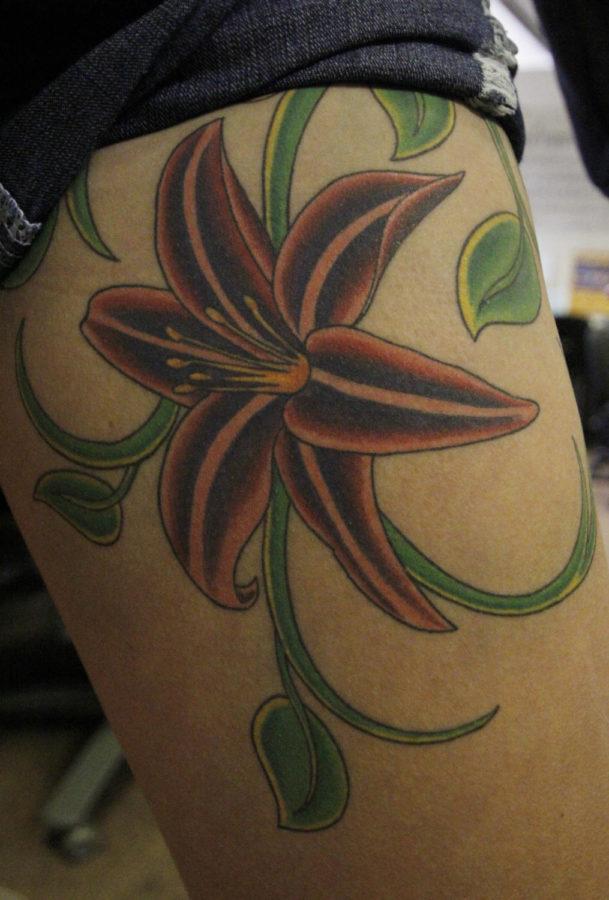Neuendorf: Tattoo bearers bear brunt of unfair discrimnation
Jonathan Krueger/Iowa State Daily
Despite the increasing popularity of tattoos, many employers still discriminate against potential employees who have tattoos.
October 4, 2013
“Don’t judge a book by its cover.”
Adults tell kids this at the beginning of elementary school to teach them they cannot determine whether they will like the story that the book tells from the cover. As children grow up, this phrase becomes a metaphor for how skin color, height, weight and other appearance factors are no way to determine the character and value of a person.
It is illegal for employers to fire or not hire an individual based on race, sex and religion, but there is no such guideline for one particular characteristic: tattoos. Before I get branded for extreme ignorance for even comparing race, sex and religion (all pardoned, or at least federally protected traits) to tattoos — yes, I know the apparent similarities are slim to none, but what they represent is not all that different.
Even though nearly impossible to change, inborn characteristics — or whatever someone chooses to take place of those traits — represent a part of an identity. In an ideal world, this identity fragment would be met with self-acceptance and pride. Skin ink symbolizes a similar aspect of someone’s identity; it is just done in a louder, more focused fashion.
Yes, a tattoo has the ability to sew a piece of someone’s soul on to their flesh, but even then it can be used as a weapon against him or her. I am not saying this is unfair, for it all is within the context of the tattoo. If the design is offensive or vulgar without proper defense explaining otherwise, then yes, that should permit employment limitation.
However, in more cases than not, the design is a harmless form of expression that many workplaces require be hidden by clothing or makeup. Even more disheartening, corporations can still cite this as a reason not to hire an individual, regardless of other markers of proficiency.
So, why the stigma? Throughout various eras of history, tattoos have been seen as strictly for sailors or menacing, leather-clad biker dudes. Since then, the view for some has barely shifted. For those people, tattoos of any conviction are still seen as a stamp of immaturity, immorality, and disrespect to the body that will be regretted once the age of wrinkling is reached and gravity forces the former masterpiece to take a completely different configuration.
What tattoos have actually grown to represent — to me, most of my generation, and a fair amount of adults — is nothing short of beautiful. They can display a vulnerability we are too timorous to reveal through spoken word. They can document milestones we value too much to risk to be forgotten. They can be mysterious to make the host an enigma, who becomes accustomed to others curiously asking: “What exactly does it mean?” They can even be silly reminders that life is not all that serious.
A rising trend is for brand-new 18-year-olds to get inked up, not in an act of rebellion against the system, but as a way of shedding old skin. For many, the tattoo allows a buried part of identity to finally rise to the surface. I will admit to partial bias on the subject, for I have taken part in my generations’ movement in biting the stick and suffering the needle for a little bit of external expression.
For me, the immortality of the imprint presented no anxiety; it was instead the fact that this small, inoffensive triangle tattoo could possibly cost me a job. After considering the potential consequences for a bit, I boldly settled that if an employer were to discriminate against my rudimentary shape and thus, against me, then that work environment wouldn’t be a good fit for me anyways.
Though still fresh, I could not be prouder of my ink. I love explaining to bewildered bystanders the complex concept of getting a triangle because it represents minimalism and through that simplicity it actually represents everything in the world, but then turning around and telling my close friends I got a triangle because they look cool. Hopefully, a majority of tattoo owners view their designs as extensions of themselves and adore the tale they tell, whether silly or serious.
Remember what you learned as a kid — don’t judge a book by its cover.
But if the cover happens to be intriguingly decorated, you might want to pick it up and learn the story.

















